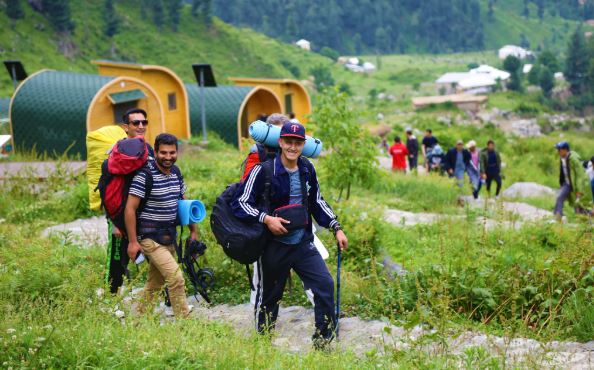Introduction
How can I be an eco-friendly traveller? This is a question more people are asking as they look for ways to minimize their environmental impact while exploring new destinations. Sustainable travel is about making conscious decisions that protect the planet, from choosing eco-friendly accommodations to reducing waste. Whether you’re a seasoned traveler or planning your next trip, adopting eco-friendly practices can make a real difference. In this guide, we’ll share practical tips for becoming an eco-conscious traveller, helping you explore the world while caring for the environment. Let’s get started on your journey to more sustainable travel!
Table of Contents
Why Should You Be an Eco-Friendly Traveller?
In today’s world, the need for sustainability has never been more urgent. As a traveller, the choices you make during your journey have a significant impact on the environment. Whether you’re planning a trip to explore the natural beauty of Pakistan or relaxing at a beach resort, adopting eco-friendly travel practices is not just a trend—it’s a responsibility.

1. Combatting Climate Change
One of the main reasons to become an eco-friendly traveller is to help combat climate change. The tourism industry is responsible for a substantial portion of global greenhouse gas emissions, particularly through transportation. By making more sustainable choices—such as opting for trains or buses over flights or choosing energy-efficient accommodations—you can contribute to reducing carbon emissions, which play a major role in global warming.
2. Preserving Natural Resources and Ecosystems
Travelling, especially in natural and pristine areas, can put immense pressure on local ecosystems and wildlife. Overuse of water, waste generation, and the destruction of habitats due to tourism activities can harm the environment. Being an eco-friendly traveller means taking steps to minimize these negative impacts. By choosing eco-conscious travel methods and respecting nature, you help preserve the environment for future generations to enjoy.
3. Supporting Local Communities and Sustainable Economies
Eco-friendly travel also has a positive social impact. By supporting local, sustainable businesses, you contribute directly to the local economy. Eco-conscious travellers often choose accommodations and activities that are owned and operated by locals, thus helping to create jobs and ensure the economic growth of the community. In addition, sustainable tourism often focuses on preserving cultural heritage, offering travellers a richer, more authentic experience.

4. Reducing Waste and Pollution
The tourism industry generates significant amounts of waste, from plastic bottles to food wrappers, and much of it ends up in landfills or oceans. As an eco-friendly traveller, you can take small actions that add up to a big difference—carrying reusable water bottles, avoiding single-use plastics, and picking up after yourself. These simple steps can drastically reduce the amount of waste generated during your travels and help keep the environment cleaner.
5. Encouraging Sustainable Practices in the Travel Industry
The more travellers choose eco-friendly options, the more businesses in the travel industry will adapt to meet those demands. By opting for eco-friendly airlines, accommodations, and tour operators, you’re sending a message to the industry that sustainability is important. As more people choose environmentally friendly options, the industry as a whole is incentivized to adopt greener practices, from using renewable energy to adopting waste-reduction initiatives.
6. Making a Positive Impact on Your Well-Being
Lastly, being an eco-friendly traveller can positively impact your own well-being. Many eco-conscious travel practices, such as connecting with nature, supporting organic and local foods, and focusing on mindfulness, can enhance your travel experience. Rather than rushing through a trip, you’re likely to experience a deeper sense of connection to the places you visit and the people you meet.
Tips for Becoming an Eco-Friendly Traveller
If you’re passionate about travel but also care about the environment, adopting eco-friendly travel practices is a must. Eco-friendly travelling allows you to explore the world while minimizing your environmental impact. Whether you’re planning a short trip or an international journey, small actions can add up and make a big difference in preserving the planet’s natural beauty. Below are some practical tips to help you become a more sustainable and eco-conscious traveller.
1. Choose Eco-Friendly Transportation
One of the most impactful decisions you can make as a traveller is how you get to your destination. Transportation—especially air travel—accounts for a large portion of global carbon emissions. Here are some tips to reduce your carbon footprint:
- Fly less, travel more by train or bus: Opting for trains and buses instead of flights is one of the most effective ways to lower your carbon footprint. In countries like Pakistan, train travel can offer a scenic, peaceful alternative to flying, allowing you to experience more of the local culture.

- Consider direct flights: If flying is necessary, choose direct flights. Take-off and landing are the most fuel-intensive parts of a flight, so reducing the number of flights you take can help reduce emissions.
- Use eco-friendly transport at your destination: Once you arrive, try using public transportation, bicycles, or electric scooters to get around. These options are more sustainable than renting a car or relying on taxis.
2. Stay at Eco-Conscious Accommodations
Where you stay plays a huge role in your travel’s environmental impact. Many hotels and resorts now focus on sustainability and adopt practices to reduce waste, conserve energy, and support local communities. Here’s how you can choose eco-friendly accommodations:
- Look for green certifications: Many hotels now have eco-certifications such as Green Key or EarthCheck. These certifications ensure that the hotel follows environmentally friendly practices, such as waste reduction, water conservation, and the use of renewable energy sources.
- Support eco-lodges and homestays: In countries like Pakistan, there are eco-lodges and homestays run by locals that embrace sustainable practices. By staying in these types of accommodations, you not only minimize your carbon footprint but also support the local economy and culture.
- Minimize energy usage: When staying in hotels, be mindful of energy use. Turn off lights, air conditioning, and electronics when not in use. Some eco-friendly hotels even encourage guests to reduce water and electricity consumption with special programs or incentives.
3. Reduce Single-Use Plastics
One of the biggest environmental issues caused by tourism is the excessive use of single-use plastics. From water bottles to plastic bags, these items contribute massively to waste and pollution, especially in natural areas. Here’s how you can reduce your plastic use:
- Carry reusable items: Bring a reusable water bottle, shopping bag, and coffee cup with you. Many airports and public places now offer water refill stations, so you can stay hydrated without contributing to plastic waste.
- Say no to plastic straws: Carry a reusable straw made from stainless steel or bamboo. Many cafes and restaurants offer paper or metal straws upon request, or you can bring your own.

- Choose products with minimal packaging: Avoid packaged snacks or products with excessive plastic. Opt for locally sourced, unpackaged foods whenever possible to reduce waste.
4. Support Local and Sustainable Businesses
When you travel, your choices can help promote sustainable economic practices. By supporting local businesses that focus on sustainability, you contribute to the local economy and help preserve the cultural and environmental integrity of the area.
- Shop locally and sustainably: Purchase items from local markets or shops that prioritize sustainability. Buy handmade crafts, local food products, and sustainable souvenirs rather than mass-produced items that can harm the environment.
- Eat at eco-friendly restaurants: Look for restaurants that source their ingredients locally, prioritize organic produce, and minimize food waste. Many eco-conscious eateries also focus on plant-based menus, which have a lower environmental impact than meat-heavy dishes.
- Stay away from wildlife tourism: Avoid activities that exploit or harm animals, such as elephant rides, wildlife shows, or unethical safaris. Instead, opt for nature reserves or eco-tours that support conservation efforts and responsible wildlife interaction.
5. Pack Light and Thoughtfully
The weight of your luggage impacts the environment in terms of fuel usage, especially when flying. Packing light can significantly reduce your carbon footprint. Additionally, being thoughtful about what you pack can reduce waste and energy consumption during your trip.
- Pack only what you need: Avoid overpacking, as heavier luggage leads to more fuel usage. Stick to the essentials, and choose items that can be reused, like a compact towel or a portable charger.
- Opt for eco-friendly toiletries: Instead of packing single-use plastic toiletries, choose eco-friendly alternatives. Bring solid shampoo bars, refillable containers, or biodegradable wipes. Many brands offer eco-friendly travel-sized products that are good for both your skin and the environment.
6. Minimize Waste and Recycle
Waste management is a critical aspect of eco-friendly travel. In many tourist destinations, waste management systems are often overwhelmed, and plastic waste can end up in natural areas. Here’s how you can do your part in reducing waste:
- Dispose of waste responsibly: Always use recycling bins when available, and try to minimize your waste while travelling. If you come across areas with limited recycling facilities, consider carrying your recyclables with you until you can dispose of them properly.
- Carry a reusable bag: Bring a cloth bag or a foldable shopping bag that you can use for carrying groceries or any items you pick up while shopping. This will prevent you from using plastic bags and reduce the amount of waste generated.
7. Respect Nature and Wildlife
Eco-friendly travellers also focus on leaving nature as they found it. Respecting the natural environment and wildlife is critical to sustainable travel, especially in places where ecosystems are fragile.
- Leave no trace: Follow the “leave no trace” principle, which includes packing out all your trash, staying on designated trails, and not disturbing wildlife or natural habitats. This ensures that the ecosystems you enjoy remain intact for future generations.
- Don’t disturb wildlife: Avoid feeding or approaching wild animals. This can alter their natural behavior and create long-term harm. Respect their space and enjoy observing them from a distance.
8. Educate Yourself and Others
Becoming an eco-friendly traveller isn’t just about taking personal action—it’s also about educating others and raising awareness about sustainable travel. Share your eco-friendly practices with fellow travellers and encourage others to adopt sustainable travel methods.
- Spread the word: Share your eco-friendly travel tips on social media or with your friends and family. You can inspire others to travel responsibly and create a larger impact.
- Learn about local environmental issues: Research the environmental issues in the destinations you visit. Understanding the local challenges can help you make better decisions while travelling and support conservation efforts in the region.
Be a Responsible Visitor
Whether you’re trekking in the Hunza Valley or exploring the historical sites of Lahore, always respect the local people and their environment. Avoid making loud noises, littering, or engaging in activities that harm nature.
Conclusion: Embrace Eco-Friendly Travel for a Better Tomorrow
Becoming an eco-friendly traveller is all about making mindful decisions that support both the environment and local communities. Whether you’re opting for sustainable transportation, choosing eco-conscious accommodations, or minimizing waste, each action you take helps reduce your carbon footprint and contributes to a more sustainable world. When you travel through the natural beauty and cultural richness of Pakistan or anywhere else, it’s not just about the destinations—it’s about how you travel and the positive impact you leave behind.
By supporting ethical businesses and adopting eco-friendly practices, you play a part in preserving the planet for future generations. As an eco-friendly traveller, you’re not only discovering new places—you’re also protecting them. So, the next time you embark on your journey, make it a conscious one. Travel with care, and together, we can create a more sustainable future.
FAQ
Question1. How can I minimize waste while traveling eco-friendly?
Answer. Carry reusable items like water bottles, bags, and containers. Opt for digital tickets and avoid single-use plastics. Be mindful of packaging and dispose of waste responsibly.
Question2. Is eco-friendly travel more expensive?
Answer. Eco-friendly travel may cost more upfront, but it can save you money in the long run with options like public transportation or off-season travel. The benefits often outweigh the cost.
Question3. How can I travel sustainably to remote areas?
Answer. Choose eco-lodges, follow “Leave No Trace” principles, and support local guides and community-run initiatives. Respect nature and wildlife to minimize your environmental impact.




